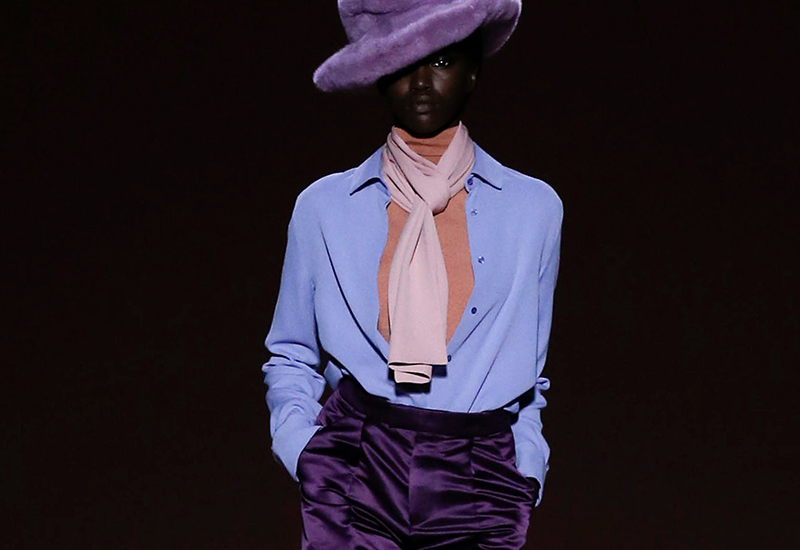Top Wardrobe Investments to Make Right Now with Sedgars
Top Wardrobe Investments to Make Right Now with Sedgars
Blog Article
The Influence of Lasting Practices on Modern Style Styles
Sustainable practices have improved modern-day style, driving a change in the direction of eco-friendly products and honest production. Developers currently favor organic cotton, recycled fabrics, and innovative textiles. Upcycling has transformed waste into one-of-a-kind garments, while transparency in sourcing has become necessary. This evolution shows a growing understanding amongst customers regarding their getting selections. As the industry adapts, brand-new fads arise that difficulty traditional aesthetic appeals. What might the future hold for fashion in this framework?
The Rise of Eco-Friendly Materials
Just how have green materials transformed the apparel industry? The development of environment-friendly products has considerably improved style, driving brand names to reevaluate their sourcing and manufacturing procedures. These sustainable options, consisting of organic cotton, hemp, and recycled polyester, use a lowered ecological impact compared to conventional textiles. Designers are now focusing on these materials, recognizing that consumers increasingly favor brand names dedicated to sustainability.This change has actually brought about cutting-edge methods, where style residences trying out eco-friendly materials and all-natural dyes, improving both visual allure and eco-friendly responsibility. In enhancement, collaborations in between designers and sustainability-focused companies have actually increased the integration of environmentally friendly products right into mainstream collections.As a result, the style market is witnessing a extensive but progressive adjustment, relocating towards a much more lasting future. This dedication not just shows developing consumer worths however likewise demonstrates the capacity for fashion to lead in ecological stewardship.
Upcycling: Changing Waste Into Fashion
Upcycling has emerged as a transformative pressure in the garment industry, transforming disposed of products into preferable garments and devices. This ingenious approach not just lowers waste yet additionally urges creative thinking and creativity amongst developers. By repurposing products such as old garments, material scraps, and even non-textile products, upcycling develops special pieces that narrate, showing private style and ecological consciousness.Many independent designers and modern brands have accepted upcycling as a core practice, appealing to customers who value sustainability and uniqueness. The procedure often entails techniques like reconfiguration, jumble, or decoration, enabling for limitless opportunities in style. Because of this, upcycled fashion reverberates with those looking for to make environmentally accountable selections while still revealing personal aesthetics.In essence, upcycling not just mitigates the environmental influence of fashion waste but additionally promotes a brand-new culture of development and admiration for workmanship within the sector.
Moral Manufacturing: Fair Labor and Transparency
Honest manufacturing in fashion highlights the value of fair salaries for employees, guaranteeing that workers receive just settlement for their initiatives. Transparency in supply chains is important, enabling customers to recognize the beginnings of their garments and the conditions under which they are made. Furthermore, ethical sourcing practices advertise obligation in choosing products, enhancing the dedication to sustainability and social justice.
Fair Wages for Workers
While the garment industry progressively welcomes sustainable practices, making sure fair salaries for employees continues to be an important element of honest production. Fair salaries not only encourage employees but likewise improve the overall lifestyle for people in the supply chain. Numerous brand names are now embracing plans that focus on equitable payment, recognizing that a sustainable future can not be improved exploitation. By devoting to fair pay, companies promote commitment and boost productivity among their employees (Sedgars South Africa). Additionally, customers are coming to be much more mindful of labor issues and are increasingly demanding transparency relating to employees' rights. Therefore, brand names that prioritize reasonable salaries are not just straightening with ethical criteria however are additionally placing themselves competitively in a market that worths social responsibility
Transparency in Supply Chains
The commitment to reasonable earnings is intrinsically linked to the wider problem of transparency in supply chains within the fashion industry. Transparency guarantees that consumers are educated regarding the beginnings of their clothing and the problems under which they are created. Brand names that prioritize transparency often publish detailed records describing their supply chain procedures, labor methods, and sourcing of materials. This openness fosters count on and loyalty amongst customers that significantly require ethical techniques. Openness aids to hold companies liable for their labor methods, making it possible for examination and encouraging improvements. By revealing the intricacies of their supply chains, brand names can add to an extra equitable fashion environment, inevitably promoting not just moral production but likewise lasting consumption amongst their customers.

Honest Sourcing Practices
As customers become a lot more aware of the influence of their getting decisions, brand names are significantly embracing moral sourcing methods that prioritize reasonable labor and environmental sustainability. These practices involve making sure that employees get reasonable wages, secure working conditions, and are treated with self-respect. Many fashion firms are relocating away from unscrupulous labor techniques and are rather working together with providers that follow honest requirements. Transparency in sourcing additional enhances consumer depend on, as brand names divulge their supply chain techniques, enabling customers to make enlightened selections. This change towards ethical sourcing not just adds to social responsibility yet additionally reverberates with a growing market that values sustainability in vogue. Because of this, ethical sourcing is coming to be a specifying feature of modern-day fashion brand names.
The Role of Technology in Lasting Fashion
The fashion market has actually long been associated with waste and contamination, innovation is increasingly changing it into a more lasting field. Advancements top article such as 3D printing make it possible for developers to produce garments with less product waste, while digital textile printing enables for on-demand production, decreasing excess stock. In addition, developments in recycling technologies are promoting the repurposing of textiles, minimizing land fill contributions.In enhancement, information analytics and artificial intelligence aid brand names anticipate patterns a lot more properly, guaranteeing they generate only what is needed. Blockchain innovation enhances openness in supply chains, enabling customers to map the beginnings of their clothing and confirm sustainable methods. Additionally, wearable innovation is progressing, advertising durability and functionality in style products. Through these technological developments, the fashion industry is gradually adopting an extra circular economic situation version, fostering lasting methods that might redefine its environmental influence.

Conscious Consumerism: Moving Purchaser Mindsets
Aware consumerism is improving the garment industry as customers increasingly focus on honest style selections. This change is driven by a demand for transparency, engaging brands to reveal their methods and supply chains. As an outcome, brand name commitment is advancing, with consumers most likely to support those that align with their values.
Honest Fashion Selections
Shifting customer frame of minds towards moral fashion selections shows an expanding understanding of the impact of customer behavior on the setting and culture. Consumers are progressively focusing on brands that emphasize moral manufacturing methods, sustainable materials, and fair labor problems. This modification is sustained by a desire to sustain business that line up with personal worths, advertising a much more responsible apparel industry. Therefore, brand names are adapting their approaches, integrating transparency and sustainability into their core objectives. Ethical fashion choices not only challenge conventional retail practices however likewise urge consumers to review the lifecycle of their garments. This change indicates a collective relocation towards a much more aware technique to style, where the effects of purchases expand beyond mere visual appeals to include broader ecological and social factors to consider.
Effect of Openness

Brand Commitment Change
What drives consumers to remain dedicated to brand names in today's fashion landscape? Significantly, sustainability plays an essential duty. As recognition of ecological issues expands, consumers are moving towards brand names that demonstrate honest techniques and transparency. This change in the direction of conscious consumerism has resulted in a reevaluation of traditional brand commitment, where worths straighten more very closely with individual ethics. Brands that focus on sustainable materials, reasonable labor practices, and eco-friendly manufacturing techniques are commonly rewarded with customer loyalty. This development is reflected in buying decisions, as purchasers are extra going to sustain brands that add positively to society. Sustainability has ended up being not just an advertising device, but a defining factor in establishing lasting brand links with a much more socially conscious and critical consumer base.
The Influence of Sustainable Style on Fads
As customers progressively prioritize sustainability, the garment industry is experiencing a considerable change in patterns. This change has actually brought about the rise of green products, such as natural cotton, recycled polyester, and innovative fabrics stemmed from lasting sources. Developers are significantly concentrated on developing functional, long-lasting garments that urge conscious consumption, relocating far from quick style's fleeting styles.Moreover, honest practices are ending up being a trademark of brand identification, with lots of business highlighting their dedication to reasonable labor and environmental stewardship. The influence of lasting fashion is also evident in the appeal of thrift buying and garments swaps, advertising a round economic situation and minimizing waste.Fashion shows and campaigns currently frequently include lasting collections, stressing the visual appeal of eco-conscious options. In general, the influence of sustainable style on patterns reflects a more comprehensive social shift towards accountable consumerism, forming the future of the industry in extensive methods.
Future Innovations in Eco-Conscious Style
The advancement of sustainable style fads lays the groundwork for future developments in eco-conscious style. As consumers progressively prioritize ecological responsibility, developers are checking out cutting-edge products and methods. Biodegradable fabrics, such as mycelium and algae-based fabrics, are getting grip, assuring to decrease waste and dependence on petroleum-based fibers.Moreover, innovations in innovation are leading the way for innovative manufacturing approaches. 3D printing, get more for circumstances, enables on-demand manufacturing, reducing excess inventory and resource usage. Round style versions are also arising, emphasizing recycling and upcycling, making it possible for garments to have actually prolonged life cycles.Collaboration in between brand names and technology companies is vital for these advancements. By leveraging information analytics and expert system, designers can produce more lasting supply chains and reduce their carbon impacts. As eco-conscious techniques remain to advance, they essentially transform the fashion landscape, pushing the borders of imagination while securing the world.
Often Asked Questions
Just How Can I Identify Lasting Style Brands When Shopping?
To determine sustainable style brands while buying, one ought to try to find qualifications, look at materials, evaluate manufacturing openness, and research brand name values. Premium Fashion Sedgars. Engaging with consumer testimonials and sustainability reports can better assist enlightened investing in choices
Are Second-Hand Clothes Took Into Consideration Lasting Fashion?
Used clothing are usually considered sustainable fashion due to their duty in decreasing waste and extending the lifecycle of garments. By buying previously owned items, consumers add to an extra environment-friendly garments economic situation.
What Is the Ecological Influence of Quick Style?
The environmental influence of quick fashion is substantial, adding to pollution, extreme waste, and source depletion. The industry's rapid manufacturing cycles often focus on profit over eco-friendly sustainability, exacerbating environment modification and harming environments worldwide.
Just How Do Lasting Practices Affect Style Pricing?
Lasting practices usually lead to greater manufacturing prices due to moral sourcing and eco-friendly materials. Sedgars. Style pricing might boost, reflecting the financial investment in environmental obligation and fair labor methods, which can affect customer investing in choices.
Can Lasting Fashion Be Stylish and trendy?
The concern of whether lasting fashion can be fashionable and fashionable typically occurs. Numerous developers now blend environmentally friendly products with innovative designs, confirming that sustainability and modern appearances can exist side-by-side, appealing to a fashion-conscious audience. Lasting methods have improved modern fashion, driving a change towards green products and moral manufacturing. While the style industry significantly welcomes lasting practices, making sure reasonable wages for workers remains a crucial part of moral manufacturing. Conscious consumerism is reshaping the style sector as purchasers significantly focus on honest fashion options. The influence of lasting style is also evident in the popularity of thrift buying and garments swaps, decreasing and promoting a round economic climate waste.Fashion shows and campaigns now often feature sustainable collections, stressing the visual appeal of eco-conscious selections. To recognize lasting style brand names while buying, one must look for certifications, look at products, evaluate production openness, and research study brand values.
Report this page